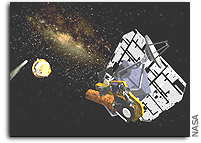Observe the Deep Impact Spacecraft Close In On Comet Tempel 1

Don Yeomans and Ron Baalke
NASA’s Near Earth Object Program Office
February 3, 2005
An interactive 3D orbital plotter has been developed to show the trajectories of the Deep Impact spacecraft as it approaches and runs closely past comet Tempel 1. The red orbital path of the Deep Impact spacecraft shows for dates beyond the launch on January 12, 2005 with the pink portion of the trajectory being above the Earth’s orbital plane and the dark red portion being below this plane. To minimize the energy (i.e., fuel) needed to launch the spacecraft, the comet encounter takes place very near the point where the comet passes through the plane of the Earth’s orbit (ecliptic plane); by launching from Earth, the spacecraft is already in the ecliptic plane so that no fuel need be used to push the spacecraft out of this plane.
By running the orbital plotter forward in time, you will note that the comet overtakes the spacecraft on July 4, 2005 with a relative velocity of 10.2 kilometers per second (23,000 mph) and it is at this time that the impactor spacecraft will collide with the comet. After observing the impact itself, the flyby spacecraft will continue in its obit about the sun, pass within 0.033 AU (about 4.9 million km or 3 million miles) of Mars on January 6, 2007, and return to the Earth’s neighborhood in late January 2008 – some 3 years and two full orbits about the sun after launch. If the spacecraft is healthy and if NASA is able to grant the necessary permission and resources, the spacecraft could then be re-targeted for another cometary flyby by using the Earth encounter to re-shape the spacecraft’s trajectory.








